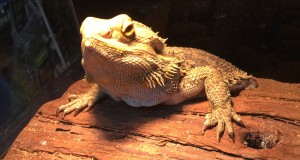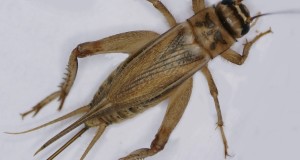Reptile medicine is advancing admirably, but even experienced veterinarians are sometimes baffled by conditions that show generalized symptoms – lack of appetite, loose stool, lethargy, etc. Recently, an interesting case involving a Leopard Gecko (Eublepharis macularius) has opened up a promising new window into reptile health care.
Aging – or not?
The animal in question, a 13 year old Leopard Gecko, began losing weight, shedding frequently and passing loose stool. In older animals, there is sometimes a tendency to write such things off as more or less “normal”, but many herps are surprising us with their longevities (a Red Salamander in my collection is near 30, a Ball Python at a zoo topped 50 years of age, and so on…) and so age may not always be a factor. After many tests, the ailing gecko was referred to Dr. Thomas Boyer in San Diego, CA.
A Bold Diagnosis and Treatment
Suspecting Hyperthyroidism (excessive Thyroid Gland activity) Dr. Boyer had a CT Scan performed at the Veterinary Imaging Center of San Diego, which had on hand 1 of only 5 CT Scanners in the USA that are small enough to handle Leopard Geckos. Hyperthyroidism had never previously been detected in a Leopard Gecko, but the CT Scan confirmed the veterinarian’s suspicions.
The standard therapy – treatment with Radioactive Iodine – was also untried, but Dr. Boyer was able to extrapolate from studies done on mammals (not an easy task, I’m sure!). Now (March, 2010), 3 months after treatment, the lizard’s thyroid values are normal, and the animal is in fine shape.
A Lesson for Herp Owners
It is this type of dedication and ability that keeps our hobby, and the conservation of reptiles and amphibians, moving ever forward. Search for a dedicated veterinarian (please see my articles below) and don’t be so quick to assume that your pet is just “getting old” – captive Leopard Geckos have lived in excess of 30 years!
Further Reading
Please see my articles on Reptile and Amphibian Health for more on the care of ailing geckos and other species.
An interesting article on Leopard Gecko natural history and use as a lab animal is posted here.
 That Reptile Blog – Reptile, Amphibian and Exotic Pet Care and Information
That Reptile Blog – Reptile, Amphibian and Exotic Pet Care and Information



Dear Frank,
I’m so upset, my leopard gecko has stopped eating…I adopted him 10 months ago, he stopped eating crickets about 6 months ago. He has been eating mealworms and has loved them but about 5 days ago he stopped eating…Tempature is OK, Humidity is OK..All he wants to do is hide behind his house and spread out his legs and slep. I’e never seen such a relaxed gecko…. Can you help me…please..
Hello Janis, Frank Indiviglio here.
Thanks for your interest in our blog.
If you are in the northern hemisphere, it may be that the gecko is responding to the change in seasons; leopard geckos often stop feeding in the fall even if kept warm. They seem to respond to an “internal clock”.
However, a blockage or other problem can also cause him to stop feeding. Mealworms are very high in chitin, and often cause blockages, especially if the only other food is a hard-bodied insect such as crickets. To be safe, a vet exam is your best option…please let me know if you need help in locating a vet.
Please also write back concerning his full diet, supplements, etc. so we can discuss any changes that might be useful.
Good luck and please keep me posted.
Best regards, Frank Indiviglio.
Our gecko is 10 years old 1 month ago he quit eating his crickets, before that he was shedding more than normal. He is very skinny. Don’t know what to do. Thought it was old age until I read your article . I don’t if there is a reptile vet in the twin cities. Thanks Connie
Hello Connie, Frank Indiviglio here.
Thanks for your interest in our blog; yes good idea to see a vet as a number of ailments could be involved. Check here for a reptile vet in your area; if none are convenient, try calling others in the general vicinity – it’s a small specialty and you should be able to get a reference.
Please also check this list posted by the NY Turtle and Tortoise Society; the Reptile Dept. of your closest zoo may also be able to recommend someone.…please be in touch if you need further info and I’ll search further.
Good luck and please keep me posted.
Best regards, Frank Indiviglio.
Thank you
Hello Connie, Frank Indiviglio here.
My pleasure; the vets listed on the NYTTS site will usually treat lizards as well as turtles.
Hope all goes well- please keep me posted; always helpful to hear abut diagnosis/treatment.
Best regards, Frank Indiviglio.
Dear Frank, we brought our desert leopard gecko to a reptile vet . VAC in mpls. Mn. this morning. They were going to hydrate her with an injection , and help feed her wax worms, and baby food,, and keep her overnight. We thought she would get better, but they just called us and she passed away . I didn’t there were reptile vets, thanks for your advice, we just thought she was old, that’s what the pet store said,maybe if we could got her to vet sooner she would of made it. Thanks again Connie
Hello Connie, Frank Indiviglio here.
Thanks for the feedback. You took the right steps…even with quick action, we lose a great many ill reptiles once an illness or infection takes hold. This is true even in the collections of the world’s largest zoos – at the Bronx Zoo we autopsy each fatality, but we still have a great deal to learn about even the most common species.
If you decide to get another gecko or other reptile, please feel free to write in beforehand and we can review husbandry.
Best regards, Frank Indiviglio.
I need some assistance with my pet Leopard Gecko. He is reapidly losing weight and has recently developed a covering over his eyes. I will take him to a vet (need to find a good reptie one in Philadelphia) but wondering what I can do now!!
Dirk
Hello Dirk, Frank Indiviglio here.
Thanks for your interest in our blog and sorry to hear the bad news. A vet visit is your best option – until then, keep the animal warm (don’t let temperature drop at night if that had been your practice) to encourage immune system function.
You can check here for herp vets in PA; if none are close ask for a reference. Please write back if you do not have any luck, as I can check other sources.
Good luck and please keep me posted.
Dear Mr. Indiviglio, We have a Leopard Gecko. She is about 8 or 9 years old. She was 100% fine until about 3 months ago. She started to look much thinner(even her tail which had always been so full), started shedding frequently, and one of her eyes will not open. She is still active and hunts her crickets with great enthusiasm even with one eye working. Please any help or advice you can give will be greatly appreciated! I know something is just not right with her. Thank you, Patricia De Cristofaro
Hello Patricia
Thanks for your interest. If the gecko is eating yet losing fat reserves a number of problems could be at the root…internal parasitic infections are most commonly involved; bacterial infections possibly, but the lizard would likely have become debilitated by now. The eye problem may be related, i.e. secondary infection that takes hold once the immune system is depressed, or can perhaps be the result of a retained eyelid lining (please see here for more info on that condition).
Unfortunately, there is no way to diagnose the problem without a vet visit; please let me know if you need help in locating an experienced vet in your area.
If crickets are the animal’s sole diet, there are likely nutritional concerns as well. Please check out this article when you have a chance, and write back if you’d like to discuss some changes.
I hope all goes well. Good luck, and please keep me posted.
Best regards, Frank Indiviglio.
We have a leopard gecko and have had him about 6-7 months old he has been growing rapidly and eating well until a few days ago he has not been eating and his tail is starting to get smaller he seems to want to eat (he will not eat crickets only meal worms) but when he goes to eat them he can not get ahold of them or keep hold of them he acts almost fetigued any sugestions?
Hello Amanda,
Thanks for your interest. Unfortunately, the lizard likely has a vitamin/mineral deficiency. Difficulty in catching food is sometimes related to a lack of Calcium and/or Vit A, but other problems may be involved. Mealworms, even if powdered with supplements, are not an adequate diet. Please see this article for further information.
Leopard geckos sometimes slow down in winter; please let me know the average day and night temperatures in the terrarium, and how it is heated, and I’ll provide some ideas if needed.
You’ll need to bring your gecko to a vet experienced with reptiles, as tests must be done in order to pinpoint the problem; please let me know if you need help in finding a local vet.
Please let me know if you need any further information. Good luck, enjoy and please keep me posted.
Best regards, Frank Indiviglio.
I’ve just read the above article concerning Hyperthyroidism in Geckos. I have a pelomedusa Subrufa (african side neck turtle) that has just been diagnosed with this condition after blood tests by a specialist exotic vet (she’s shedding constantly). She is due to start meds in a couple of days (they have to order it in) The meds are in gel form and usually used to treat cats. I will have to place a small amount on her skin and keep her out of water for about 10 mins for it to be absorbed. The other option if this doesn’t work is surgery, after a ct scan to see if it’s operable. The radioactive iodine hasn’t been mentioned but I will mention it to my vet when I see her.
Hello Karen,
Very interesting, thank you. Please let me know how all goes, I’ll share with other interested turtle owners as well. Good luck, best, Frank